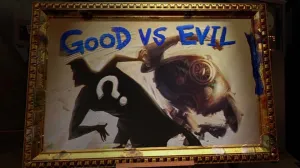In the 39 years since his debut, Michael Myers has become a definitive visage of horror, not only standing alongside other franchise favorites like Freddy Krueger and Jason Voorhees, but giving the Creature from the Black Lagoon, Dracula, and the Wolf Man runs for their money. While many horror fans consider Michael Myers the most integral component of the franchise, we posit that, in fact, the exploration of the character has ruined the Halloween franchise.
Videos by ComicBook.com
In the original Halloween, a young Michael Myers kills his older sister on Halloween night, resulting in his imprisonment in a mental facility. 15 years later, Myers breaks out of the facility and heads to his hometown of Haddonfield, IL. In the small town, Laurie Strode (Jamie Lee Curtis) spends Halloween night on the phone with her friends while babysitting two neighborhood kids. Laurie has seen a masked Michael around town, but makes nothing of it, only for the killer to pick off her friends one by one, leading to a confrontation with Laurie.
The film was a huge success, spawning nine follow-up films in the franchise, with the last one having hit theaters in 2009. Next year, a new chapter in the saga is slated to hit theaters, written and directed by David Gordon Green and Danny McBride.
Only a few details about the upcoming film has been released, like Jamie Lee Curtis returning and the film taking place after the events of the original film, but we hope the film actually ditches its reliance on Michael Myers.
Mysterious Michael Myers
The success of the original film comes from a variety of factors, from the cinematography to the score to the performances, but the biggest strength is the mysterious nature of Michael himself.
Throughout Halloween, Laurie doesn’t believe what the audience can see clearly, which is that Michael has targeted her for some unknown reason. Given that it’s Halloween night, Laurie tries to convince herself she has no reason to fear seeing someone in an intimidating mask and jumpsuit, as the entire town is littered with children in costumes. At one point, Michael even opts to take a ghost costume from one of his victims to get closer to a different victim, playing on the fears that you don’t know the type of person who could be lurking under the mask.
Years later, the slasher Silent Night, Deadly Night was able to capture similar fears, as it featured a man in a Santa suit murdering people he deemed “naughty,” but with the amount of people dressed as Santa, there are multiple cases of mistaken identity.
In our daily lives, we’ve all gotten an unsettling vibe from people we encounter in public and, while we always want to find the best in people, sometimes this feeling is tough to shake. In the case of Halloween, director John Carpenter and co-writer Debra Hill posed the question: what if that person who made you uncomfortable really was out to get you, and would stop at nothing to harm you?

John Carpenter’s Vision
Unlike a series like the Child’s Play franchise, where each installment was written by the same person (Don Mancini), Carpenter wanted to distance himself from the series after the original film.
“I didn’t think there was any more story, and I didn’t want to do it again,” Carpenter told Deadline in 2014. “All of my ideas were for the first Halloween – there shouldn’t have been any more!”
Given the original film’s success, Carpenter didn’t get much say in what the studio did with the property, but he at least attempted to guide the direction of the series.
“I couldn’t stop them from making sequels,” Carpenter confessed. “So my agents said, ‘Why don’t you become an executive producer and you can share the revenue?’ But I had to write the second movie, and every night I sat there and wrote with a six pack of beer trying to get through this thing. And I didn’t do a very good job, but that was it. I couldn’t do any more.”
Unnecessary Lore
The second film drew the connection that Laurie was Michael’s long-lost sister, creating the premise that this character aimed to kill off all of his family members for an unknown reason.
“Michael Myers was an absence of character. And yet all the sequels are trying to explain that,” Carpenter pointed out. “That’s silliness – it just misses the whole point of the first movie, to me. He’s part person, part supernatural force. The sequels rooted around in motivation. I thought that was a mistake.”
Halloween III: Season of the Witch attempted to depart from the Michael Myers mythology, in hopes of sticking more in line with Carpenter’s outlook of the franchise, but the tale of a villainous novelty company that made masks which would kill the child wearing it when a specific jingle was played didn’t resonate with audiences quite as well.
That installment solidified that Myers would be the main component of all films going forward, while also marking the last time Carpenter had direct involvement in the franchise, having written the score with Alan Howarth.

The Mythology Continues
After multiple installments that followed the repetitive format of Michael stalking his family members, Halloween: The Curse of Michael Myers aimed to not only explain how one human could survive bullets, knives, and explosions, but also set the stage for the following film to divert from this specific character. The film explained that a cult had abducted Michael as a baby and imbued him with a curse, which caused him to kill his family and resist all injuries. That film ended with the curse leaving Michael and entering his caretaker since the first film, Dr. Loomis (Donald Pleasence).
Unfortunately, this departure from the predictable path of Michael traveling from Point A to Point B and killing people along the way didn’t sit well with test audiences, forcing the filmmakers to re-edit the film to make it a more standard entry into the franchise.
In 1998, Halloween H20: 20 Years Later brought Jamie Lee Curtis back into the fold, ostensibly erasing the events of films three through six. It was a financial success, but the follow-up is regarded as one of the worst installments in the entire franchise.
In 2007, Rob Zombie gave his own interpretation of the original film, exploring what Michael was like as a kid and his relationship with Dr. Loomis (Malcolm McDowell) before his escape from an institution to head to Haddonfield. The film was one of the more stylistic entries in the series, but devout fans took issue with how much time Zombie spent with a young Michael, finding the exploration of the character to be unnecessary.
No Mythology Necessary
Throughout the Nightmare on Elm Street series, fans fell in love with Freddy Krueger, as his wordplay and macabre sense of humor made him an entertaining, albeit frightening presence. Similarly, killer doll Chucky from the Child’s Play series has gained a passionate following as he combines the innocence of a doll with the horrifying elements of a serial killer, making for a compelling juxtaposition.
Much like Myers, Jason Voorhees from the Friday the 13th films doesn’t say much and spends most of his time lumbering after his victims. The difference with Jason, however, is that he died as a boy due to counselors being preoccupied with sex and drugs and not realizing that Jason was drowning in a lake, motivating the killer to vanquish anyone imbibing in these vices. Interestingly, the creation of the series came after the success of Halloween and the concept of setting a horror film on an iconic date, without ever developing the direction the series would take.
Compared to all other iconic killers in horror franchises, Myers, as a persona, is completely devoid of any personality or humanity, making for an incredibly dull character. His targets are those with direct connections to his family, which doesn’t strike fear into the hearts of most audiences.
Ultimately, Michael Myers is a bland, faceless killer whose reputation is built solely on killing people tangentially related to his bloodline. Any attempt to deviate from these character traits results in dismissal from audiences, which relegates the character to repeat his blandness until the end of time.
If you’d like to see the same horror movie repeated over and over, then the Halloween franchise and Michael Myers is a safe bet, but there are plenty of other slashers films that are far more worthy of investing your time into.








